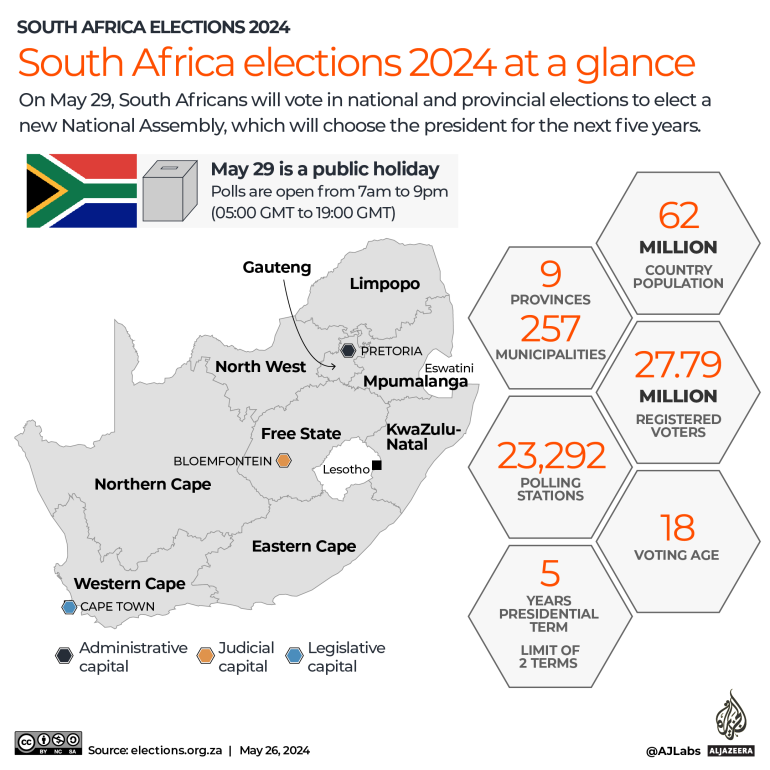South Africa Elections 2024 will be on 29th May 2024.
Candidates and Key Players
On May 29, South Africans will head to the polls to elect a new National Assembly and state legislatures. The main contenders in this election are the African National Congress (ANC), the Democratic Alliance (DA), and the Economic Freedom Fighters (EFF). The ANC, led by current President Cyril Ramaphosa, faces significant challenges with a noticeable decline in voter support compared to previous elections. On the right, the DA campaigns on a platform of clean governance and market-led economic policies but struggles with perceptions of catering to white interests. On the left, the EFF advocates for land reform and extensive government intervention, criticizing the ANC’s failure to address racial inequalities effectively. Additionally, the newly formed MK party, led by former President Jacob Zuma, adds a new dynamic by appealing to those disillusioned with Ramaphosa’s leadership.
Importance of the Election
This election is crucial for several reasons. Firstly, it marks a potential end to the ANC’s 30-year dominance since the end of apartheid. The decline in ANC’s popularity signifies widespread dissatisfaction with persistent issues such as corruption, unemployment, and economic inequality. Should the ANC fail to secure a majority, it will be forced into coalition politics, fundamentally altering the political landscape. The necessity to form coalitions could lead to policy compromises and a shift in governance style, introducing a new era of political uncertainty in South Africa.
South Africa’s Political System
South Africa operates under a parliamentary representative democratic republic. The President of South Africa serves as both the head of state and the head of government, elected by the National Assembly. The bicameral parliament consists of the National Assembly and the National Council of Provinces. This structure, rooted in the post-apartheid constitution of 1996, emphasizes democratic governance, judicial independence, and protection of human rights. The proportional representation system aims to ensure that the diversity of political views is reflected in the legislative process.
Election Process and Key Details
On May 29, South Africans will vote in national and provincial elections to elect a new National Assembly and state legislatures. The National Assembly will choose the president for the next five years. This will be the country’s seventh democratic general election since apartheid ended in 1994 when Nelson Mandela was elected president with the ANC winning 62.5 percent of the 400 seats in the National Assembly. To maintain its majority, the ANC needs to secure 50 percent of the National Assembly seats in this election.
According to the Electoral Commission of South Africa (IEC), 27.79 million South Africans aged 18 and above have registered to vote this year. Registered voters living abroad cast their votes on May 17 and 18, and voters with special needs, including pregnant women and people with disabilities, will cast their ballots two days before election day on May 27 and 28.
South Africa follows a proportional representation system, and for the first time, independent candidates will compete in the elections. To accommodate this change, voters will receive three ballots instead of two, each requiring a choice of one party or candidate: two ballots for electing the National Assembly and a third for electing members of the provincial legislature in each of South Africa’s nine provinces.

Political Actors and Key Events
The ANC’s historical narrative, tied to the liberation from apartheid, faces diminished resonance among younger voters frustrated with contemporary issues. Allegations of corruption, particularly during Jacob Zuma’s presidency, have significantly tarnished the party’s image. Zuma’s tenure was notably marked by the Nkandla scandal and allegations of state capture. Current President Ramaphosa’s efforts to reform the party and combat corruption have been undermined by his own scandals and perceived inaction, leading to disillusionment among supporters.
The DA, under the leadership of John Steenhuisen, offers a vision of clean governance and economic reform but struggles with historical perceptions of racial bias. The EFF, led by Julius Malema, capitalizes on the demand for radical economic change and land reform but faces skepticism regarding its capacity to govern effectively.
The emergence of the MK party, formed by Zuma, further complicates the political landscape. The MK’s appeal to ANC loyalists dissatisfied with Ramaphosa’s leadership threatens to split the ANC vote, potentially reducing its parliamentary majority and necessitating coalition governance.
Election Facts
- Total Population: 62 million
- Registered Voters: 27.79 million
- Polling Stations: 23,292
- Voting Age: 18
- Presidential Term: 5 years, maximum of 2 terms
- Provinces: 9
- Municipalities: 257
On election day, polling stations will be open from 7am to 9pm, with the day declared a public holiday to facilitate voting. Early voting provisions are made for independent candidates and special needs voters.
Outcomes and Future Scenarios
Coalition politics bring both opportunities and challenges for South Africa. A coalition government may enhance accountability and foster more robust parliamentary oversight. However, it also brings potential instability and the risk of policy stagnation. Despite the symbolic end of ANC dominance, significant policy shifts are unlikely in the short term. Economic policies, particularly regarding unemployment and inequality, will remain constrained by existing structural challenges and political dynamics.
South Africa’s foreign policy is expected to maintain its balanced stance between BRICS and Western countries. The continuity in diplomatic approaches aims to avoid alienating major global partners while advocating for multilateral reforms.
In conclusion, the upcoming South African election represents a critical juncture in the nation’s post-apartheid history. While the potential end of ANC’s dominance introduces new political dynamics, the fundamental challenges of governance, economic inequality, and corruption persist. The evolution of coalition politics will be crucial in shaping South Africa’s future trajectory, balancing the need for stability with the demand for transformative change.
References
Mpofu-Walsh, S. (2024, May 28). South Africa’s High-Stakes, Low-Impact Election: Why an End to the ANC’s 30-Year Reign Won’t Change the Country. Foreign Affairs. Retrieved from Foreign Affairs
Interactive – South Africa Elections 2024 – How Voting Works. (2024, May 26). Al Jazeera. Retrieved from Al Jazeera
Electoral Commission of South Africa (IEC). (2024). Election Information. Retrieved from IEC


